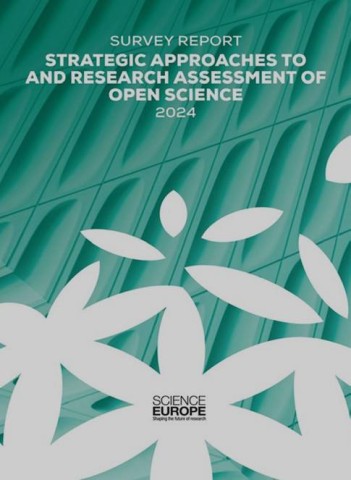Special Issue: Open Science in its many forms - Science Europe’s recent work to bring together actions on Open Science and research assessment reform
Newsletter
Bionote
James Morris is a Senior Policy Officer at Science Europe. He joined the organisation in 2019 and has a background in marine and molecular biology. He was a Marie Skłodowska- Curie Actions Experienced Researcher at the Royal Belgian Institute of Natural Sciences and holds a PhD in Marine Science from the University of Southampton, UK. At Science Europe, he leads activities aimed at improving the conditions for high-quality research and the evolution of research cultures. He has led the development of recommendations on research assessment and was a member of the drafting team of Coalition for Advancing Research Assessment (CoARA).
Open science and research assessment reform have been long-standing priorities at Science Europe. A recent survey report and project explores the critical role that public research funding and performing organizations in Europe play in the evolving landscape on both topics and highlights the interdependencies and mutual actions that improve our research systems and enhance the quality and impact of research.

In your role at Science Europe, what changes have you seen in the engagement of research stakeholders towards the adoption of Open Science?
At Science Europe, we have made efforts to engage more with different stakeholder groups when developing policy and practice recommendations. This is part of our strategic priority on ‘contributing to the evolution of research cultures’ across Europe and globally. The voice of the research community is vital when discussing how to better support and recognize open science practices, and how to make research assessment processes more effective and efficient. I have been delighted to see how enthusiastic and actively engaged many early career researchers are in these policy discussions, and it gives me confidence that initiatives like CoARA and the Diamond Open Access movement can have a positive impact.
There has been significant movement toward reforming research assessment. What role do you see international collaborations, like those within CoARA, playing in aligning research assessment practices across member organizations?
Research assessment reform has been a topic of discussion for decades, but the recent CoARA agreement and the rapid expansion of the CoARA membership (now at around 700 member organizations) shows that the time is right to push for important changes to how we assess researchers, research projects, and research institutions. Although organizations and national systems will approach assessment processes in different ways based on their own contexts, it is important there is some degree of alignment and consistency. Research systems are connected, knowledge flows, and researchers are often mobile. A set of shared principles, common values, and a collective mission is important in advancing knowledge and contributing to the global challenges we face – international collaborations on things like research assessment reform are key, and, when done right, will help to better support researchers and research ideas.

How do you envision expanding the scope of open science monitoring mechanisms beyond current focuses, such as open-access publications and FAIR data?
Our recent survey highlights the expanding set of activities and actions that contribute to open science. There is a clear broadening of open science beyond the established or traditional elements of open access to publications and research data, to more emerging elements of open science, such as open research methods or public engagement. These emerging elements of open science all contribute to the quality of research and should be valued and recognized in assessment processes. In parallel, monitoring mechanisms can provide valuable information that can help adapt and further support how we embed and value. At the same time, we must take care not to overburden researchers and research managers with these monitoring processes.
You were an MSCA Early-Stage Researcher in Horizon 2020. How did your experience as a researcher influence your work at Science Europe?
I joined Science Europe in 2019 after several years as a post-doctoral researcher (including as 2-years as an Experienced Researcher within an MSCA Innovative Training Network) and following a short period as a research consultant. I found it fascinating to have the same discussions on research assessment and open science as I had done with colleagues and supervisors in the lab, but now from a different viewpoint. Although I was not very policy-engaged during my time as a researcher, I, like most, inherently knew the issues and challenges associated with how researchers and research projects are assessed, and the opportunities and challenges in trying to contribute to open science. Discussions in the lab about: which journal to target and why; how to share data, and the meaninglessness of the H-index as a way to judge researchers, all translate directly into the work I now do at Science Europe. I have enjoyed building an understanding of how national organizations work to support research, and my experiences as a researcher have been invaluable in understanding how and where the expectations of individuals and organizations align, and how we can work together to improve the conditions and culture in support of attractive work environments and quality research.
James Morris
LinkedIn
Senior Policy Officer, Science Europe
james.morris@scienceeurope.org
Bluesky @jpmorris.bsky.social
